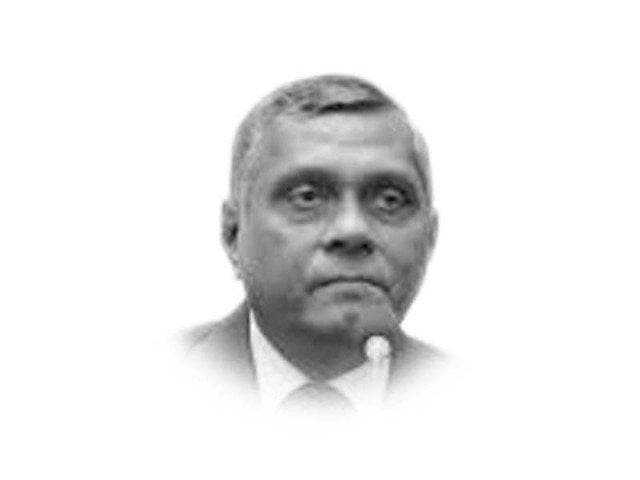
A year after Moscow’s military invasion of Kyiv, it is now a war of survival for both Russia and Ukraine. When the war began, Russia was confident that it would defeat Ukraine in a short span of time but it turned out to be a war of nerves. Ukraine, because of its resilience and military support from the West, managed to turn the tide and challenged Moscow’s invasion.
An article titled ‘Ploughshares into swords’ published in the February 11 issue of The Economist (London) reads: “The message that Russia is fighting for the survival against an encroaching West has become a powerful tool for repression. But it will mean ever-growing demands by the Kremlin on Russia’s long-suffering people.” President Vladimir Putin’s apprehensions about Nato’s encirclement of Russia prompted him to attack Ukraine a year ago. Russia’s pre-conceived notions about Ukraine joining Nato were not false because of President Volodymyr Zelenskyy’s overt tilt towards the West confirming Putin’s worst fears about the encirclement of his country.
Containing Russia is an age-old dream of the West which was conceived during the years of Czarist Empire and reached its peak during the Crimean war of 1853-56 and the Russo-Japanese war of 1904-05. During the Soviet days, it was the formation of Nato in April 1949 which was meant to contain Communist USSR. Following the Soviet disunion and the end of the cold war, the West, particularly Nato, thought that the days of Russian threats were over but it was a wrong assumption because within 20 years of the Soviet disintegration, Moscow was able to re-emerge as a powerful actor in global affairs. It was under the leadership of President Putin that Moscow proved that “Russia was down but not out”. The critical assault of Russia against the West took place in 2014 when its forces occupied Crimea, an integral part of Ukraine, prompting sanctions imposed by the US and its Nato allies.
A year after the outbreak of the Russia-Ukraine war, it is time to analyse how the two countries got bogged down in a bloody armed conflict leading to thousands of deaths and injuries and losses of billions of dollars in one year. Yet, it appears that the standoff in the Russia-Ukraine war and its devastating implications on global economy and security will further plunge Moscow and Kyiv in a war without winners. President Zelenskyy may have got reassurances from Washington and its Nato allies of sustained military support in order to repulse Russian missile attacks, but the West has shrewdly avoided direct confrontation with Moscow. President Joseph Biden of the US, while expressing his country’s solidarity with Kyiv, announced visiting Poland, a neighbour of Ukraine, but avoided visiting that war-torn country which is a victim of Russian aggression.
Nato’s rhetoric supporting Kyiv was expressed on January 30 this year when its Secretary General Jens Stoltenberg stated, “We feel that they (the Russians) are preparing for more war, that they are mobilizing more solders, more than 200,000 and potentially even more than that.” Hypocrisy and deceit is the culture of the US and the West which is now again reflected in the Russia-Ukraine war in the form of empty promises to Kyiv. The Ukrainian president’s assertion before the EU leadership during his recent visit to Brussels that his country was fighting a war for Europe should be taken seriously. If Russia manages to occupy Kyiv, it will be in the backyard of Hungary and Czech Republic, the two members of Nato.
The Russia-Ukraine war of survival is now a reality and needs to be analysed from three perspectives.
First, Russia is a rich country with vast mineral resources and nuclear arsenal, is a permanent UNSC member and possesses $600 billion worth of foreign exchange reserves; but its war of survival is focused on preventing further encirclement of its territory by Nato. To its astonishment, it was during the 10th century when Russia was born in Kyiv but Ukraine is now a hostile country whereas former members of the Warsaw Pact, like Poland and Hungary, are now part of the European Union and Nato. Latvia, Lithuania and Estonia, once a part of the defunct USSR, are now members of Nato; and Ukraine in order to prevent further Russian military onslaught is seriously thinking to join the Atlantic alliance. Encirclement of Russia has been a nightmare for its rulers since the days of Peter the Great and Catherine the II but reflects a Western mindset not to give Moscow any space to reclaim its superpower status. Fear of encirclement by the West led to the strengthening of the Sino-Russian nexus and offering the sale of cheap oil and gas to countries hit hard because of the energy crisis as a result of the war in Ukraine. Imposing sanctions on Moscow is counterproductive because it has augmented Russian resilience to counter Western pressures.
Second, Putin’s onslaught against Ukraine has prompted a demand to declare Russia an international pariah because of the massive human rights’ violation by Russian forces. It is the fear of growing international pressure condemning Moscow’s relentless missile attacks on civilian targets in Ukraine which has prompted Putin to generate feelings of patriotism and jingoism. Putin’s survival strategy, following the war with Ukraine, reflects mobilisation of forces and imposing curbs on anti-war demonstrations in Russia. The demand to declare Russia as a pariah state is made by Ukraine, based on the colossal damages done because of the severe missile attacks and human rights violations. In an article published in The Economist (London) issue of February 14, it is revealed that, “The war has poisoned large areas of Ukrainian farmland. Dangerous chemicals and fuels, released from exploded rockets and the tens of thousands of artillery shells that are being fired by both sides every day, have leaked into the ground along the length of the front line.” Ukraine is planning to demand war reparations from Russia because so far damages worth $46 billion have been caused to the country’s infrastructure in the last one year.
Finally, Ukrainian war of survival is based on national resilience, patriotism and support from the West. Even then, Ukraine has not been able to push Russian forces out of its territory or cause any major dent in the Putin’s regime. More than Russia, it is Ukraine which is vulnerable to foreign occupation. It is yet to be seen how the war of nerves will shape things in the ongoing Russia-Ukraine war.
Published in The Express Tribune, February 21st, 2023.
Like Opinion & Editorial on Facebook, follow @ETOpEd on Twitter to receive all updates on all our daily pieces.













COMMENTS (1)
Comments are moderated and generally will be posted if they are on-topic and not abusive.
For more information, please see our Comments FAQ